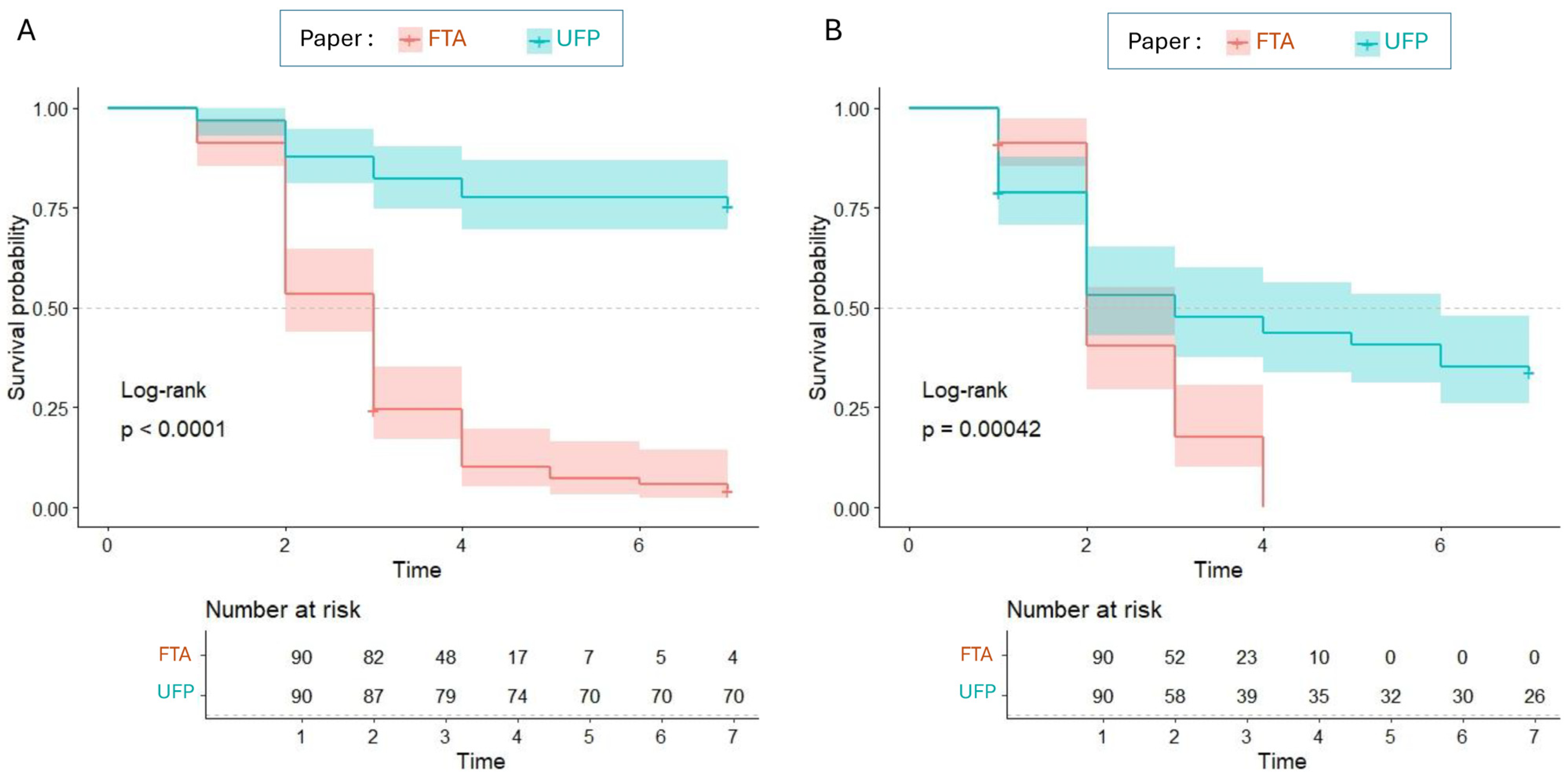Impact on Aedes aegypti Mosquitoes Exposed to Honey-Impregnated Flinders Technology Associates (FTA®) Cards
Abstract
Author Contributions
Funding
Institutional Review Board Statement
Informed Consent Statement
Data Availability Statement
Acknowledgments
Conflicts of Interest
References
- Hall-Mendelin, S.; Hewitson, G.R.; Genge, D.; Burtonclay, P.J.; De Jong, A.J.; Pyke, A.T.; van den Hurk, A.F. FTA Cards Facilitate Storage, Shipment, and Detection of Arboviruses in Infected Aedes Aegypti Collected in Adult Mosquito Traps. Am. J. Trop. Med. Hyg. 2017, 96, 1241–1243. [Google Scholar] [CrossRef] [PubMed]
- Smit, P.W.; Elliott, I.; Peeling, R.W.; Mabey, D.; Newton, P.N. An Overview of the Clinical Use of Filter Paper in the Diagnosis of Tropical Diseases. Am. J. Trop. Med. Hyg. 2014, 90, 195–210. [Google Scholar] [CrossRef] [PubMed]
- Matheus, S.; Meynard, J.-B.; Lacoste, V.; Morvan, J.; Deparis, X. Use of Capillary Blood Samples as a New Approach for Diagnosis of Dengue Virus Infection. J. Clin. Microbiol. 2007, 45, 887–890. [Google Scholar] [CrossRef] [PubMed]
- Fynmore, N.; Lühken, R.; Kliemke, K.; Lange, U.; Schmidt-Chanasit, J.; Lurz, P.W.W.; Becker, N. Honey-Baited FTA Cards in Box Gravid Traps for the Assessment of Usutu Virus Circulation in Mosquito Populations in Germany. Acta Trop. 2022, 235, 106649. [Google Scholar] [CrossRef] [PubMed]
- Wipf, N.C.; Guidi, V.; Tonolla, M.; Ruinelli, M.; Müller, P.; Engler, O. Evaluation of Honey-Baited FTA Cards in Combination with Different Mosquito Traps in an Area of Low Arbovirus Prevalence. Parasit. Vectors 2019, 12, 554. [Google Scholar] [CrossRef] [PubMed]
- Hall-Mendelin, S.; Ritchie, S.A.; Johansen, C.A.; Zborowski, P.; Cortis, G.; Dandridge, S.; Hall, R.A.; van den Hurk, A.F. Exploiting Mosquito Sugar Feeding to Detect Mosquito-Borne Pathogens. Proc. Natl. Acad. Sci. USA 2010, 107, 11255–11259. [Google Scholar] [CrossRef] [PubMed]
- Rückert, C.; Ebel, G.D. How Do Virus-Mosquito Interactions Lead to Viral Emergence? Trends Parasitol. 2018, 34, 310–321. [Google Scholar] [CrossRef] [PubMed]
- Flies, E.J.; Toi, C.; Weinstein, P.; Doggett, S.L.; Williams, C.R. Converting Mosquito Surveillance to Arbovirus Surveillance with Honey-Baited Nucleic Acid Preservation Cards. Vector Borne Zoonotic Dis. 2015, 15, 397–403. [Google Scholar] [CrossRef] [PubMed]
- Kurucz, N.; Minney-Smith, C.A.; Johansen, C.A. Arbovirus Surveillance Using FTATM Cards in Modified CO2 -Baited Encephalitis Virus Surveillance Traps in the Northern Territory, Australia. J. Vector Ecol. 2019, 44, 187–194. [Google Scholar] [CrossRef] [PubMed]
- Van den Hurk, A.F.; Hall-Mendelin, S.; Johansen, C.A.; Warrilow, D.; Ritchie, S.A. Evolution of Mosquito-Based Arbovirus Surveillance Systems in Australia. J. Biomed. Biotechnol. 2012, 2012, 325659. [Google Scholar] [CrossRef] [PubMed]
- Therneau, T.M.; Lumley, T.; Elizabeth, A.; Cynthia, C. Survival: Survival Analysis. 2021. Available online: https://CRAN.R-project.org/package=survival (accessed on 8 February 2022).
- Drawing Survival Curves Using ggplot2. Available online: https://rpkgs.datanovia.com/survminer/ (accessed on 8 February 2022).
- R Core Team. R: A Language and Environment for Statistical Computing; R Foundation for Statistical Computing: Vienna, Austria, 2020; Available online: https://www.r-project.org/ (accessed on 20 June 2024).
- Guidez, A.; Fontaine, A.; Yousfi, L.; Moutailler, S.; Carinci, R.; Issaly, J.; Gaborit, P.; Cannet, A.; de Laval, F.; Matheus, S.; et al. Noninvasive Detection of Zika Virus in Mosquito Excreta Sampled from Wild Mosquito Populations in French Guiana. J. Med. Entomol. 2024, 61, 818–823. [Google Scholar] [CrossRef] [PubMed]
- Katz, R.S.; Premenko-Lanier, M.; McChesney, M.B.; Rota, P.A.; Bellini, W.J. Detection of Measles Virus RNA in Whole Blood Stored on Filter Paper. J. Med. Virol. 2002, 67, 596–602. [Google Scholar] [CrossRef] [PubMed]
- Prado, I.; Rosario, D.; Bernardo, L.; Alvarez, M.; Rodríguez, R.; Vázquez, S.; Guzmán, M.G. PCR Detection of Dengue Virus Using Dried Whole Blood Spotted on Filter Paper. J. Virol. Methods 2005, 125, 75–81. [Google Scholar] [CrossRef] [PubMed]
- Fiorenzano, J.M.; Koehler, P.G.; Xue, R.-D. Attractive Toxic Sugar Bait (ATSB) For Control of Mosquitoes and Its Impact on Non-Target Organisms: A Review. Int. J. Environ. Res. Public Health 2017, 14, 398. [Google Scholar] [CrossRef] [PubMed]

Disclaimer/Publisher’s Note: The statements, opinions and data contained in all publications are solely those of the individual author(s) and contributor(s) and not of MDPI and/or the editor(s). MDPI and/or the editor(s) disclaim responsibility for any injury to people or property resulting from any ideas, methods, instructions or products referred to in the content. |
© 2024 by the authors. Licensee MDPI, Basel, Switzerland. This article is an open access article distributed under the terms and conditions of the Creative Commons Attribution (CC BY) license (https://creativecommons.org/licenses/by/4.0/).
Share and Cite
Guidez, A.; Fontaine, A.; Cannet, A.; Dusfour, I.; Girod, R.; Briolant, S. Impact on Aedes aegypti Mosquitoes Exposed to Honey-Impregnated Flinders Technology Associates (FTA®) Cards. Trop. Med. Infect. Dis. 2024, 9, 165. https://doi.org/10.3390/tropicalmed9070165
Guidez A, Fontaine A, Cannet A, Dusfour I, Girod R, Briolant S. Impact on Aedes aegypti Mosquitoes Exposed to Honey-Impregnated Flinders Technology Associates (FTA®) Cards. Tropical Medicine and Infectious Disease. 2024; 9(7):165. https://doi.org/10.3390/tropicalmed9070165
Chicago/Turabian StyleGuidez, Amandine, Albin Fontaine, Arnaud Cannet, Isabelle Dusfour, Romain Girod, and Sébastien Briolant. 2024. "Impact on Aedes aegypti Mosquitoes Exposed to Honey-Impregnated Flinders Technology Associates (FTA®) Cards" Tropical Medicine and Infectious Disease 9, no. 7: 165. https://doi.org/10.3390/tropicalmed9070165
APA StyleGuidez, A., Fontaine, A., Cannet, A., Dusfour, I., Girod, R., & Briolant, S. (2024). Impact on Aedes aegypti Mosquitoes Exposed to Honey-Impregnated Flinders Technology Associates (FTA®) Cards. Tropical Medicine and Infectious Disease, 9(7), 165. https://doi.org/10.3390/tropicalmed9070165






